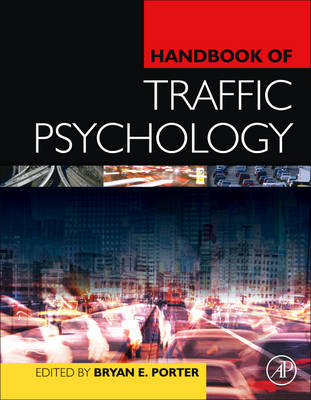
Handbook of Traffic Psychology
Academic Press Inc (Verlag)
978-0-12-381984-0 (ISBN)
The Handbook of Traffic Psychology covers all key areas of research in this field including theory, applications, methodology and analyses, variables that affect traffic, driver problem behaviors, and countermeasures to reduce risk on roadways. Comprehensive in scope, the methodology section includes case-control studies, self-report instruments and methods, field methods and naturalistic observational techniques, instrumented vehicles and in-car recording techniques, modeling and simulation methods, in vivo methods, clinical assessment, and crash datasets and analyses. Experienced researchers will better understand what methods are most useful for what kinds of studies and students can better understand the myriad of techniques used in this discipline.
Dr. Porter received his Doctor of Philosophy in experimental psychology from The University of Memphis in 1996. Currently, he is associate dean of the graduate school and professor of psychology at Old Dominion University in Norfolk, Virginia, USA. Traffic psychology has been the major focus of his publications and overall scholarship. He is president of Division 13 (Traffic and Transportation Psychology) for the International Association of Applied Psychology. He is past co-editor-in-chief of Transportation Research Part F: Traffic Psychology and Behaviour and editor of the Handbook of Traffic Psychology 1st Edition. Porter, as principal investigator, co-principal investigator, or research mentor has received more than $6 million in grants, mostly for research and evaluation activities in traffic psychology. The media regularly call on Porter to be an expert interviewee to represent the discipline.
Part One: Theories, Concepts, and Methods
Chapter 1 - How Many E's in Road Safety?
Chapter 2 - Driver Control Theory
Chapter 3 - Case-Control Studies in Traffic Psychology
Chapter 4 - Self-Report Instruments and Methods
Chapter 5 - Naturalistic Observational Field Techniques for Traffic Psychology Research
Chapter 6 - Naturalistic Driving Studies and Data Coding and Analysis Techniques
Chapter 7 - Driving Simulators as Research Tools in Traffic Psychology
Chapter 8 - Crash Data Sets and Analysis
Part Two: Key Variables to Understand in Traffic Psychology
Chapter 9 - Neuroscience and Young Drivers
Chapter 10 - Neuroscience and Older Drivers
Chapter 11 - Visual Attention While Driving
Chapter 12 - Social, Personality, and Affective Constructs in Driving
Chapter 13 - Mental Health and Driving
Chapter 14 - Person and Environment: Traffic Culture
Chapter 15 - Human Factors and Ergonomics
Part Three: Key Problem Behaviors
Chapter 16 - Factors Influencing Safety Belt Use
Chapter 17 - Alcohol-Impaired Driving
Chapter 18 - Speed(ing)
Chapter 19 - Running Traffic Controls
Chapter 20 - Driver Distraction
Chapter 21 - Driver Fatigue
Part Four: Vulnerable and Problem Road Users
Chapter 22 - Young Children and "Tweens"
Chapter 23 - Young Drivers
Chapter 24 - Older Drivers
Chapter 25 - Pedestrians
Chapter 26 - Bicyclists
Chapter 27 - Motorcyclists
Chapter 28 - Professional Drivers
Part Five: Major Countermeasures to Reduce Risk
Chapter 29 - Driver Education and Training
Chapter 30 - Persuasion and Motivational Messaging
Chapter 31 - Enforcement
Part Six: Interdisciplinary Issues
Chapter 32 - The Intersection of Road Traffic Safety and Public Health
Chapter 33 - Public Policy
Chapter 34 - Travel Mode Choice
Chapter 35 - Road Use Behavior in Sub-Saharan Africa
| Verlagsort | San Diego |
|---|---|
| Sprache | englisch |
| Maße | 216 x 276 mm |
| Gewicht | 1450 g |
| Themenwelt | Geisteswissenschaften ► Psychologie ► Klinische Psychologie |
| Geisteswissenschaften ► Psychologie ► Test in der Psychologie | |
| Naturwissenschaften ► Geowissenschaften ► Geografie / Kartografie | |
| ISBN-10 | 0-12-381984-9 / 0123819849 |
| ISBN-13 | 978-0-12-381984-0 / 9780123819840 |
| Zustand | Neuware |
| Haben Sie eine Frage zum Produkt? |
aus dem Bereich


